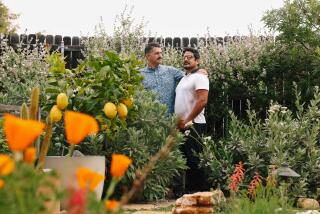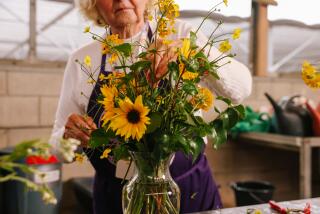Paul Ecke Jr., 76; Made Poinsettia U.S.’ Top-Selling Potted Plant
- Share via
Paul Ecke Jr., a horticulturist whose innovations transformed the poinsettia into the country’s best-selling potted plant, died of pancreatic cancer Monday at his Encinitas home. He was 76.
Ecke turned his father’s north San Diego County ranch into the nation’s largest producer of poinsettias, the distinctive red-and-green plant that has become a holiday season fixture. Of 65 million potted poinsettias sold in the United States in 2000, about 80% got their start at the Paul Ecke Ranch, founded in Encinitas in 1923 by Ecke’s father.
“The poinsettia 50 years ago was a very minor plant. The Paul Ecke Ranch and Paul Jr. in particular made it the No. 1 container plant in America,” said H. Marc Cathey, president emeritus of the American Horticultural Society.
What made Ecke’s accomplishment remarkable was the relatively short selling season for the poinsettia, which is available only about six weeks a year, from mid-November to late December.
His father, Paul Ecke Sr., developed the first poinsettia that could be successfully grown as an indoor potted plant. He began selling the vividly hued plants, native to Mexico, in the early 1900s from roadside stands in Hollywood, growing them in open fields along Sunset Boulevard, which drew busloads of tourists.
In 1923, when urbanization began to encroach on his operation, Ecke Sr. moved the business south, to 40 arid acres in Encinitas.
Ecke Jr. was born in Los Angeles but grew up in Encinitas. He served with the Navy in World War II and the Korean War and dreamed of becoming a Navy pilot, but his eyesight was not sharp enough. After completing his military service, he enrolled at Ohio State University and earned a degree in horticulture in 1949.
He went to work for his father at Ecke Ranch, which had found success selling its field-grown mother plants to greenhouse growers across the country. The greenhouse growers would derive cuttings from the plants and grow them to maturity for sale during the weeks leading up to Christmas.
Ecke Jr. pushed his father to sell cuttings instead of mother plants to growers. The advent of jet air freight made it possible for the Eckes to quickly ship delicate cuttings to growers and allow them to get mature plants to the market in a more timely manner. After considerable debate, he convinced his father that the family business needed to make this shift in order to survive.
In 1963, Ecke Jr. took over the day-to-day operations of the ranch and began to replace the fields with greenhouses, which allowed more tightly controlled growing conditions.
The first major breakthrough came in 1965, when Ecke hybridizers produced a variety of poinsettia with blooms that lasted more than a week. Until then, the plant usually dropped its leaves within a few days.
Ecke also started a breeding program in which hybridizers deliberately exposed the plant to X-rays and chemicals to produce variations. Today, the poinsettia can be found with double and triple blooms and in hues as exotic as orange and purple.
The plant is also much hardier now, lasting months instead of days. This advancement is due largely to the staff at Ecke Ranch under Paul Jr.’s leadership.
“He took a plant that easily dropped its leaves and ... transformed it,” said Cathey of the Horticultural Society. “People can keep them until April or May. How many flowering plants do you know that do that?”
But Ecke’s most profound contribution had little to do with science.
He recognized early on that women were his core customers. It rankled him that the lavish holiday layouts in the leading women’s magazines of the early 1970s showed every symbol of the season--Christmas trees, wreaths, candles, menorahs--but one: poinsettias.
Bloomed Plants Out of Season to Get Publicity
“He went to the magazines and said, ‘Hey, guys, how would you like me to give you free poinsettias for your layouts?’” recalled his son, Paul Ecke III. “Then he found out they do those layouts in July and August, so he bloomed poinsettias out of season ... and they put them in their layouts. It was a subliminal form of advertising.”
The invention of color television led to another brainstorm. Ecke donated large displays of the potted plant to popular shows, including the “Tonight Show,” the “Dinah Shore Show” and Bob Hope Christmas specials. “Johnny [Carson] would be sitting there during the holiday season, and there would be this beautiful backdrop of poinsettias,” Ecke’s son said. “This was all done with the intention of stimulating demand for poinsettias and for flowers in general.”
By 1986, the poinsettia “gently pushed chrysanthemums aside to become the No. 1 best-selling potted plant in the United States,” according to the 1998 book “Poinsettias, the December Flower” by Christine Anderson and Terry Tischer.
The Ecke Ranch now has operations in Guatemala, where it raises all of its poinsettia cuttings. Poinsettia propagation is centered at the Encinitas ranch, which also houses a large research and development division. It markets more than 60 varieties of poinsettia as well as about 300 types of bedding plants, including petunias and impatiens, under the Flower Fields brand.
Ecke’s leadership positions included presidency of the Los Angeles Flower Market. In 2001, he received the American Horticultural Society’s highest honor, the Liberty Hyde Bailey Award. He also was a major benefactor of the YMCA. His family donated land in Encinitas for the Magdalena Ecke YMCA, named for Ecke’s late mother.
Besides his son, his survivors include his wife, Maureen; daughters Sara Ecke May of Greensboro, N.C., and Lizbeth Ecke of Encinitas; and seven grandchildren.
A memorial service will be held at 2 p.m. Friday at the Magdalena Ecke YMCA, 200 Saxony Road, Encinitas.
Donations may be sent to the Paul Ecke Jr. Fellowship Fund, c/o American Floral Endowment, 11 Glen-Ed Professional Park, Glen Carbon, IL 62034, or to the Magdalena Ecke YMCA.
Those charities were important to his father, Paul Ecke III said, but the most meaningful tribute would be to “send flowers to somebody you love. That would mean a lot to him. He hated the ‘in lieu of flowers’ phrase in obituaries. He supported the flower business.”



